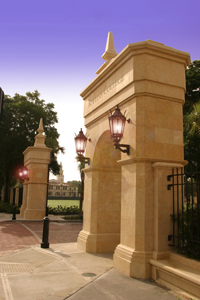WHAT IS SPIRITUALITY?
Having been asked by Rollins’ Dean of the Chapel to join a task force on enhancing spirituality in students’ lives, I said yes, I would—if only to think and talk with others about whatever spirituality might be. I’ve been giving that subject consideration.
Take 1
After some mulling, it occurs to me that spirituality simply means helping others. It is the impulse or spirit or inspiration to treat others kindly, charitably, compassionately; rather than to neglect or ignore them, especially in their needs. It comes down to that.
Perhaps it starts higher up, say with a heavenly or beatific vision or an angelic visitation that reveals the Way of Love. More likely it begins with kindnesses you’ve received from others, starting with your parents and other caregivers in your childhood. Their examples have taught you how to care for others, and you have found it gratifying to do so. Simply that.
If Jesus’ main message is the same Golden Rule we find all the world’s spiritual traditions to proclaim, then caritas or charity or a loving deed kindly motivated is the essence of spirituality—of loving kindness. It is nothing more mysterious or mystical than that, and nothing less.
Take 2
I consider spirituality as a dimension of human consciousness, even an aptitude that needs to be acknowledged and developed as part of the flourishing of our generic potentials.
In these terms spirituality would be recognized as the high end of the spectrum of human consciousness, approaching what some have called “cosmic consciousness” or “unitive consciousness” or (in religious lingo) “union with God.”
Spirituality lies in the field of human psychology, and to the extent that psychologists study the psyche or soul, developmental psychology would address, at its further reaches, the subject of soul-building as the natural upshot of human maturation, the goal of our growth.
Take 3
But what, we may ask, is the spirit in spirituality? While the Latin word
spiritus, at the root of spirituality, refers literally to breath and respiration, the prime indicator of life and aliveness, spirit suggests more: some quintessential and mysterious life force that inhabits us in life and departs from us at death, surviving the demise of the body.
Is that so? Or just a hopeful fantasy? Is there a Spirit World, perhaps including angels and devils, as is vividly imagined by poets like Dante, Milton and Blake? Is it indeed departed spirits that “spiritualists” summon and commune with in their sessions, say in Cassadega, Florida?
Doubtless, to many spirituality means communion with the Holy Spirit, supposed by Christians as one of three aspects of God: Father, Son and Holy Spirit. Thus, to be a spiritual person one prays and invokes and converses with God, seeking guidance and consolation, more profoundly than a child talking with an imaginary friend.
Or is spirituality a term for the highest level of human consciousness, a refined and rarefied state of mind that people may aspire to develop and attain—a beatific, visionary mentality that reveals Holiness and Bliss, Wonder and Awe with stunning immediacy and lasting resonance in memory?
Take 4
While a
technical education is for growing more capable and adept at performing specific functions, a
liberal education is for exercising various areas of our intellect and growing wiser.
Spirituality is an aspect of wisdom in being an opening to the higher and deeper regions of our human mentality, pointing us to higher purposes and goals and to deeper understandings of what human beings must do to flourish and fulfill ourselves.
We undertake a liberal education to liberate ourselves from narrowness and shallowness of mind and heart, and to set our lives on courses aimed at worthy, even noble, ends.
*







